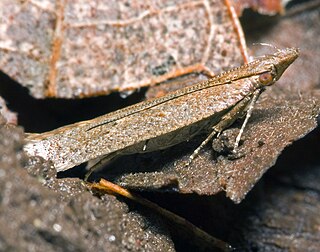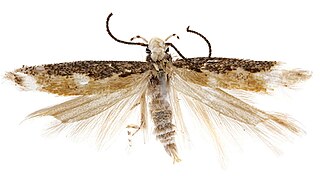
The Gelechiidae are a family of moths commonly referred to as twirler moths or gelechiid moths. They are the namesake family of the huge and little-studied superfamily Gelechioidea, and the family's taxonomy has been subject to considerable dispute. These are generally very small moths with narrow, fringed wings. The larvae of most species feed internally on various parts of their host plants, sometimes causing galls. Douglas-fir (Pseudotsuga) is a host plant common to many species of the family, particularly of the genus Chionodes, which as a result is more diverse in North America than usual for Gelechioidea.

Gelechioidea is the superfamily of moths that contains the case-bearers, twirler moths, and relatives, also simply called curved-horn moths or gelechioid moths. It is a large and poorly understood '"micromoth" superfamily, constituting one of the basal lineages of the Ditrysia.

Acompsia is a genus of the twirler moth family (Gelechiidae). Though it has once been assigned to the proposed subfamily "Anacampsinae", it is generally placed in the Dichomeridinae. Some authors include Telephila here as a subgenus, while others prefer to keep it distinct as its relationships are fairly obscure.

Aristotelia is a genus of moths in the family Gelechiidae. Well-known species are food plant specialists, and diverse hosts are used – Salicaceae, Solanaceae, Rosaceae, Fagaceae, Fabaceae, Asteraceae.

Aroga is a genus of moths in the family Gelechiidae.

Bryotropha is a genus of the twirler moth family (Gelechiidae). Among these, it is placed in the tribe Anomologini of subfamily Gelechiinae; the tribe was formerly considered a distinct subfamily Anomologinae.
Carpatolechia is a genus of moths in the family Gelechiidae.

Caryocolum is a genus of moths in the family Gelechiidae.

Megacraspedus is a genus of moths in the family Gelechiidae, found primarily in the Palearctic.

Monochroa is a genus of moths in the family Gelechiidae.

Neotelphusa is a genus of moths in the family Gelechiidae.

Scrobipalpa is a genus of moths in the family Gelechiidae. Euscrobipalpa has sometimes been treated as a distinct subgenus, or even as a full genus, but is generally no longer recognised as valid, following Ponomarenko & Park (2007).

Teleiodes is a genus of moths in the family Gelechiidae.

Xenolechia is a genus of moth in the family Gelechiidae.
Chrysoclista is a genus of moths of the family Agonoxenidae described by Henry Tibbats Stainton in 1854.
Caryocolum tischeriella(Zeller, 1839) is a moth of the family Gelechiidae. It is found in Portugal, Spain, France, Germany, Austria, Switzerland, Italy, the Czech Republic, Slovakia, Slovenia, Croatia, former Yugoslavia, Romania, Bulgaria, North Macedonia, Greece, Norway, Finland, the Baltic region and Russia, as well as on Crete and Sicily. Outside of Europe, it is found in southern Siberia, Central Asia and North Africa.
Caryocolum spinosum is a moth of the family Gelechiidae. It is found in northern Iran.

Gelechiinae is a subfamily of moths in the family Gelechiidae. It was described by Henry Tibbats Stainton in 1854.
Psoricoptera kawabei is a moth of the family Gelechiidae. It was described by Kyu-Tek Park and Ole Karsholt in 1999. It is found in Japan.
Psoricoptera latignathosa is a moth of the family Gelechiidae. It was described by Kyu-Tek Park and Ole Karsholt in 1999. It is found in China and Korea.












